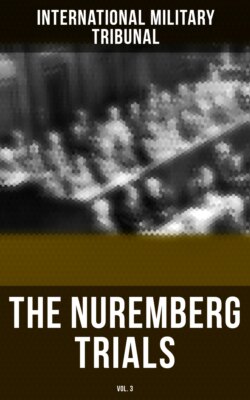Читать книгу The Nuremberg Trials (Vol.3) - International Military Tribunal - Страница 22
На сайте Литреса книга снята с продажи.
Оглавление“Absolute sovereignty and entire liberty of action only belong to such states as have not undertaken international obligations. Immediately a state accepts international obligations it limits its sovereignty.”
In that way and that way alone lies the future peace of the world. Yet it may be argued that although war itself was outlawed and forbidden, it was not criminally outlawed and criminally forbidden. International law, it may be said, does not attribute criminality to states and still less to individuals. But can it really be said on behalf of these defendants that the offense of these aggressive wars, which plunged millions of people to their death, which by dint of War Crimes and Crimes against Humanity brought about the torture and extermination of countless thousands of innocent civilians, which devastated cities, which destroyed the amenities—nay, the most rudimentary necessities of civilization in many countries—which has brought the world to the brink of ruin from which it will take generations to recover—will it seriously be said by these defendants that such a war is only an offense, only an illegality, only a matter of condemnation perhaps sounding in damages, but not a crime justiciable by any Tribunal? No law worthy of the name can allow itself to be reduced to an absurdity in that way, and certainly the great powers responsible for this Charter were not prepared to admit it. They draw the inescapable conclusion from the renunciation, the prohibition, the condemnation of war which had become part of the law of nations, and they refuse to reduce justice to impotence by subscribing to the outworn doctrines that a sovereign state can commit no crime and that no crime can be committed on behalf of the sovereign state by individuals acting in its behalf. They refuse to stultify themselves, and their refusal and their decision has decisively shaped the law for this Tribunal.
If this be an innovation, it is an innovation long overdue—a desirable and beneficent innovation fully consistent with justice, fully consistent with common sense and with the abiding purposes of the law of nations. But is it indeed an innovation? Or is it no more than the logical development of the law? There was indeed a time when international lawyers used to maintain that the liability of the state, because of its sovereignty, was limited to a contractual responsibility. International tribunals have not accepted that view. They have repeatedly affirmed that a state can commit a tort; that it may be guilty of trespass, of nuisance, and of negligence. And they have gone further. They have held that a state may be bound to pay what are in effect penal damages. In a recent case decided in 1935 between the United States and Canada, an arbitral tribunal, with the concurrence of its American member, decided that the United States were bound to pay what amounted to penal damages for an affront to Canadian sovereignty. And on a wider plane, the Covenant of the League of Nations, in providing for sanctions, recognized the principle of enforcement of the law against collective units, such enforcement to be, if necessary, of a penal character. And so there is not anything startlingly new in the adoption of the principle that the state as such is responsible for its criminal acts. In fact, save for reliance on the unconvincing argument of sovereignty, there is in law no reason why a state should not be answerable for crimes committed on its behalf. A hundred years ago Dr. Lushington, a great English Admiralty judge, refused to admit that a state could not be a pirate. History—very recent history—does not warrant the view that a state cannot be a criminal. On the other hand, the immeasurable potentialities for evil, inherent in the state in this age of science and organization would seem to demand, quite imperatively, means of repression of criminal conduct even more drastic and more effective than in the case of individuals. And insofar, therefore, as this Charter has put on record the principle of the criminal responsibility of the state, it must be applauded as a wise and far-seeing measure of international legislation.
